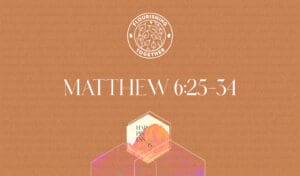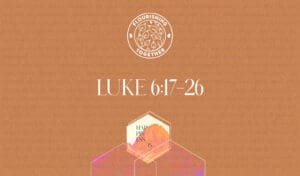
Our “Flourishing Together” journey is a 3-year shared learning experience focused on “living life as God intended.” We will continue to explore the domains of happiness, mental and physical health, meaning and purpose, close relationships, financial stewardship, and (our current study) character and virtue.
Virtue may be defined as moral excellence. It’s a manifestation of good character and an expression of spiritual maturity. Virtue reflects a person’s ability to discern God’s will and inclination to respond to him in obedience.
Virtue includes pure motive. When talking to religious people, Jesus liked to shift the focus from mere behavior to the heart behind the action. He is always interested in us not just doing the right thing but doing it for the right reason.
Virtue can be understood as applied wisdom. Wisdom in the biblical sense means seeing life from God’s perspective. Again, not just knowing what’s right, but consistently doing what’s right for the right reason. It’s a result of “being transformed by the renewing of your mind” and forming good habits that lead to good decisions.
Virtue is deeply connected to happiness and life satisfaction, not as fleeting emotion or temporary pleasure, but as a durable sense of well-being… what some have called “happiness with no hangover”… a life lived with no regrets.
Flourishing as a disciple of Jesus can be considered “the good life” because (1) it produces virtuous (good) behavior and (2) is desirable (good) and satisfying. It’s the best way to live because it’s living life as God intended.
The first 9 chapters of Proverbs offer basic instruction in how to live “the good life.” Proverbs 1:2-3 notes the necessity of “attaining wisdom and discipline; for understanding words of insight; for acquiring a disciplined and prudent life, doing what is right and just and fair.”
The Hebrew word chokmah is used 45 times in Proverbs. It’s a feminine noun that originally referred to a “skilled worker.” Thus, to be wise is to be skilled in godly living. Proverbs is full of life principles and general truths about the human condition. Many of the proverbs describe choices and consequences, probabilities and likely outcomes, cause and effect. The wise and virtuous person lives accordingly.
Tyler VanderWeele notes: “To live well requires practical wisdom to understand what good is and how to bring it about, justice to understand right action and rightly adjudicate between competing claims about what each person is due, fortitude to continue to seek good in the face of difficulties, and temperance that regulates desires and actions in the face of lower competing desires.”
Recent Posts
Desire For Happiness Is Universal Dr. Wiles has launched our “Flourishing Together” adventure with a focus on the domain of Happiness and Life Satisfaction. His sermon series during…
25 “Therefore I tell you, do not worry about your life, what you will eat or drink; or about your body, what you will wear. Is not life more…
A 3 Year Journey As we Flourish Together on this 3-year journey, one of the tools we will use is the “Flourishing Measure.” It’s a resource designed to…
17 He went down with them and stood on a level place. A large crowd of his disciples was there and a great number of people from all over…





